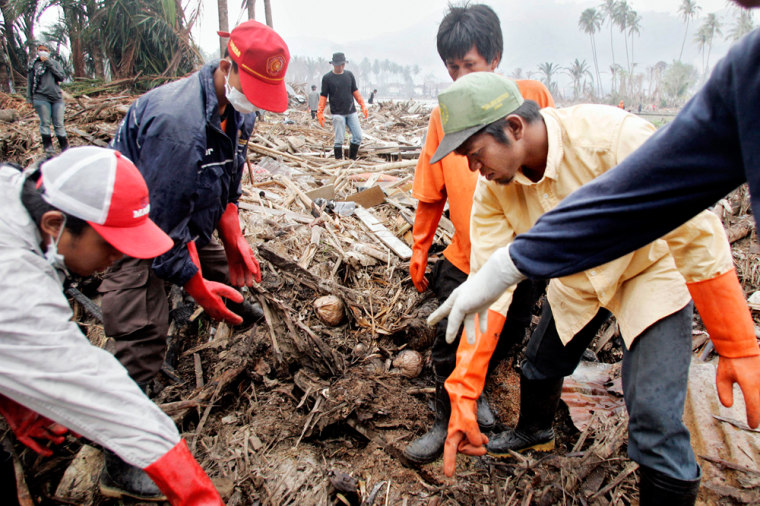Yusniar Amara and her boyfriend watched a beautiful sunset over the beach in Banda Aceh just after finishing a dive together. It was the last time they would ever see each other before the devastating Dec. 26 tsunami swept him away.
Instead of waiting for news about his fate, Yusniar, 24, put on a mask and boots and began walking the shoreline to recover bloated bodies. She’s spent the past seven weeks searching for him with no luck while retrieving thousands of other bodies for burial.
“I’d rather be doing this than just crying about it at home,” she said after pulling two bodies from the debris of what was once a hotel. “I’m very upset ... I didn’t get to talk to him.”
The 9.0-magnitude earthquake triggered giant waves that killed more than 165,000 people in 11 Indian Ocean nations. And while countries like Thailand and India have buried most of their dead, Indonesia — which lost the most — is still struggling with the task of retrieving bodies.
Thousands of volunteers spend their days in knee-deep mud, pulling bloated bodies from piles of wood and twisted metal. Unlike the early days after the tsunami, when corpses littered the landscape, most bodies are now much harder to reach.
The lack of heavy equipment and the sheer number of corpses — more than 120,000 dead in Indonesia and many more missing — means the grisly task will likely continue for months.
Flies point to bodies
Inside a small village nestled against a mountain, large swaths of land once dotted with emerald rice fields are now cluttered with heaps of tangled wooden planks, downed trees, doors and suitcases. The earth nearest the seashore is now a black, brackish sludge.
The volunteers sniff the air and look for circles of flies to help them find corpses. They stop at one site and begin digging, using only sticks and their hands to lift wood, metal and mud from atop the victim.
It takes 30 minutes to reach the bloated corpse so badly decomposed it’s impossible to decipher the gender. The crew searches for any identification before zipping the body into a bag and placing it on the roadside.
“It’s very, very hard to say we want to continue this job,” said Adi, a 25-year-old college student who left school to join one of the city’s 77 search and rescue teams. “There’s more and more and more. It might take maybe five years to take out all the bodies in Aceh.”
His group, which has dwindled to about 30 volunteers, continues to find about 15 bodies a day. They have two chain saws but no heavy machinery or shovels to lift the heavy slabs of concrete or uprooted palm trees. They trip and slide while stepping across twisted roots and planks of wood covered with rusty nails as they scour areas to try to ensure they haven’t missed anyone.
Families and businesspeople who discover bodies while clearing their property often ask the teams for help because they are afraid of removing the bodies themselves.
'Who else will do this?'
Most corpses will never be identified, but in a few cases wallets or identification cards are found and the victim’s family is located with help from agencies that keep lists of the missing.
Though the volunteers’ work is mentally and physically draining, crew members continue to smile and joke with one another. They say their dreams are not haunted by the grim images of their work and that they will continue to search until they’re forced to find other work that pays.
But, sometimes, they get something better than money. Adi, who like many Indonesians goes by only one name, said at least one person in his crew has located a dead loved one. Other volunteers say they continue to be motivated by the simple desire to see their fellow Acehnese buried with dignity.
“We cannot put it into words. It’s priceless,” said Zulfikar, 30. “If we quit, who else will do this?”
